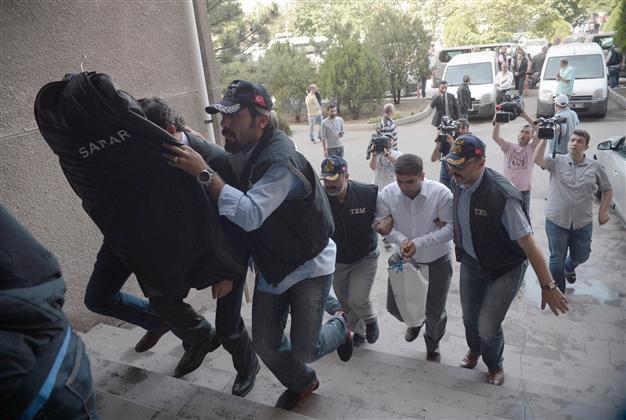Police officers use their right to silence in PM wiretap scandal
Fevzi Kızılkoyun ANKARA

Eleven police officers were detained on June 17 as part of the probe into the wiretapping of Prime Minister Recep Tayyip Erdoğan's office. AA Photo
An investigation into the wiretapping of the Turkish prime minister has already run into trouble, with some of the police officers under arrest refusing to testify to their colleagues.A prosecutor had issued search and arrest warrants for 12 police officers. Eleven of them, including Prime Minister Recep Tayyip Erdoğan’s former chief bodyguard, identified as Zeki B., and former director of the Prime Ministry’s security guard department, identified as Mehmet Y., were detained, while one is still missing.
The police also launched an operation early on June 17 and detained six suspects in Ankara, two suspects in Yozgat and three others in Istanbul, Diyarbakır and Karabük as part of the investigation being conducted on charges of “espionage.”
During the interrogation at the Counter Terrorism Division (TEM) of the Police Department, three police officers used their right to silence and were expected to give their testimonies at the Prosecutor’s Office.
Their choice to do so stems from the TEM’s refusal to share the investigation files with the suspects and their lawyers. Defense lawyers complained that their clients were being treated like “members of a terrorist organization.”
“Even they themselves do not have any idea about what to ask our clients. They do not share the content of the file with us. They are trying to find some sort of an ‘informant’ through imposing psychological pressure,” the lawyers said.
Having been taken to the court on June 20, the suspects were set to give their testimony to prosecutors at the Office for the Investigation of Crimes against the Constitutional Order.
During the four-day long interrogation at the TEM, Zeki B. and Mehmet Y. were asked whether they were aware that bugs had been put into the prime minister's office and whether they took action after they found the bugs. The other nine suspects were asked whether they had planted the bugs.
Erdoğan made public on Dec. 21, 2012 that wiretapping devices had been found in his Prime Ministry office and home, describing the move as “open espionage.” An Ankara prosecutor dealing with anti-terror cases immediately launched an investigation on the grounds that it involved an espionage-related crime.
Following the abolition of Specially Authorized Courts dealing with terror-related crimes in March this year, the case was transferred to another prosecutor dealing with crimes against the constitutional order. Many of the bodyguards working at the Prime Ministry, as well as security forces believed to have access to the Prime Ministry offices, have testified as part of the case.
The bugging devices, the serial numbers of which had already been erased, were sent to the prosecutor in May and taken in by the court’s evidence unit.
















